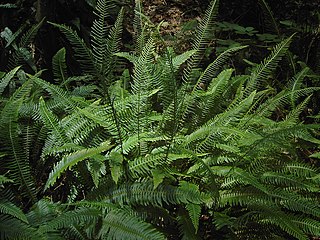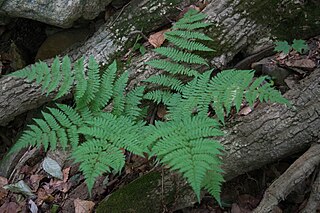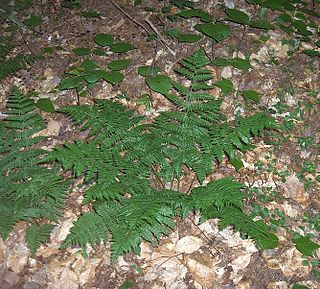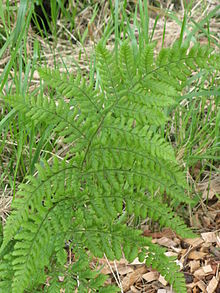
Matteuccia is a genus of ferns with one species: Matteuccia struthiopteris. The species epithet struthiopteris comes from Ancient Greek words στρουθίων (strouthíōn) "ostrich" and πτερίς (pterís) "fern".

Dryopteris, commonly called the wood ferns, male ferns, or buckler ferns, is a fern genus in the family Dryopteridaceae, subfamily Dryopteridoideae, according to the Pteridophyte Phylogeny Group classification of 2016 (PPG I). There are about 300-400 species in the genus. The species are distributed in Asia, the Americas, Europe, Africa, and the Pacific islands, with the highest diversity in eastern Asia. It is placed in the family Dryopteridaceae, subfamily Dryopteridoideae, according to the Pteridophyte Phylogeny Group classification of 2016 (PPG I). Many of the species have stout, slowly creeping rootstocks that form a crown, with a vase-like ring of fronds. The sori are round, with a peltate indusium. The stipes have prominent scales.

Dryopteris expansa, the alpine buckler fern, northern buckler-fern or spreading wood fern, is a species of fern native to cool temperate and subarctic regions of the Northern Hemisphere, south at high altitudes in mountains to Spain and Greece in southern Europe, to Japan in eastern Asia, and to central California in North America. The species was first described from Germany. It prefers cool, moist mixed or evergreen forests and rock crevices on alpine slopes, often growing on rotting logs and tree stumps and rocky slopes. It is characteristically riparian in nature, and is especially associated with stream banks.

Dryopteris filix-mas, the male fern, is a common fern of the temperate Northern Hemisphere, native to much of Europe, Asia, and North America. It favours damp shaded areas in the understory of woodlands, but also shady places on hedge-banks, rocks, and screes. Near the northern limit of its distribution it prefers sunny, well-drained sites. It is much less abundant in North America than in Europe. The plant is sometimes referred to in ancient literature as worm fern, reflecting its former use against tapeworm.

Gymnocarpium dryopteris, the western oakfern, common oak fern, oak fern, or northern oak fern, is a deciduous fern of the family Cystopteridaceae. It is widespread across much of North America and Eurasia. It has been found in Canada, the United States, Greenland, China, Japan, Korea, Russia, and most of Europe.

Osmunda regalis, or royal fern, is a species of deciduous fern, native to Europe, Africa and Asia, growing in woodland bogs and on the banks of streams. The species is sometimes known as flowering fern due to the appearance of its fertile fronds.

Astilbe is a genus of 18 species of rhizomatous flowering plants within the family Saxifragaceae, native to mountain ravines and woodlands in Asia and North America. Some species are known by the common names false goat's beard and false spirea.

Dryopteris erythrosora, the autumn fern or Japanese shield fern, is a species of fern in the family Dryopteridaceae, native to east Asia from China and Japan south to the Philippines, growing in light woodland shade on low mountains or hills.

Miscanthus sinensis, the eulalia or Chinese silver grass, is a species of flowering plant in the grass family Poaceae, native to eastern Asia throughout most of China, Japan, Taiwan and Korea.

Dryopteris affinis, the scaly male fern or golden-scaled male fern, is a fern native to western and southern Europe and southwestern Asia. It is most abundant on moist soils in woodlands in areas with high humidity, such as the British Isles and western France. In the Mediterranean region and the Caucasus it is confined to high altitudes.

Struthiopteris spicant, syn. Blechnum spicant, is a species of fern in the family Blechnaceae, known by the common names hard-fern or deer fern. It is native to Europe, western Asia, northern Africa, and western North America. Like some other species in the family Blechnaceae, it has two types of leaves. The sterile leaves have flat, wavy-margined leaflets 5 to 8 millimeters wide, while the fertile leaves have much narrower leaflets, each with two thick rows of sori on the underside.

Milium effusum, the American milletgrass or wood millet, is a species of flowering plant in the grass family Poaceae, native to damp forests of the Holarctic Kingdom.

Dryopteris carthusiana is a species of fern native to damp forests throughout the Holarctic Kingdom. It is known as the narrow buckler-fern in the United Kingdom, and as the spinulose woodfern in North America.

Dryopteris intermedia, the intermediate wood fern or evergreen wood fern, is a perennial, evergreen wood fern native to eastern North America. It is a diploid species, and is the parent of several species of hybrid origin, including Dryopteris carthusiana. Other common names for this species include intermediate shield fern, fancy wood fern, fancy fern, glandular wood fern, American shield fern and common wood fern.

Hybridization and polyploidy are common phenomena in ferns, and the genus Dryopteris is known to be one of the most freely-hybridizing fern genera. North American botanists recognized early that there were close relationships between many of the species of Dryopteris on the continent, and that these relationships reflected hybrid ancestry. The complex includes six sexual diploid parents, six sexual allopolyploids, and numerous sterile hybrids at various ploidal levels.

Dryopteris cycadina, the shaggy shield fern or black wood fern, is a species of deciduous or semi-evergreen fern in the family Dryopteridaceae, native to northern India, China, Taiwan and Japan. It grows to 60 cm (24 in) tall by 45 cm (18 in) wide, and produces pale green fronds maturing to dark green, on erect rhizomes.

Dryopteris wallichiana, the alpine wood fern, is a robust species of deciduous or semi-evergreen fern in the family Dryopteridaceae, native to the Himalayas, Hawaii, Mexico and Jamaica. It grows to 90 cm (35 in) tall, occasionally 180 cm (71 in) by 75 cm (30 in) wide, with pale green tripinnate fronds, strongly contrasting with the dark brown ribs.

Narcissus bulbocodium, the petticoat daffodil or hoop-petticoat daffodil, is a species of flowering plant in the family Amaryllidaceae, native to southern and western France, Portugal, and Spain. Some sources say that the species is also native to Morocco, but this is based on populations formerly thought to be varieties of N. bulbocodium but now regarded as separate species.

Pteris cretica, the Cretan brake, ribbon fern, or Cretan brake fern, is a species of evergreen fern in the family Pteridaceae, native to Europe, Asia and Africa.


















